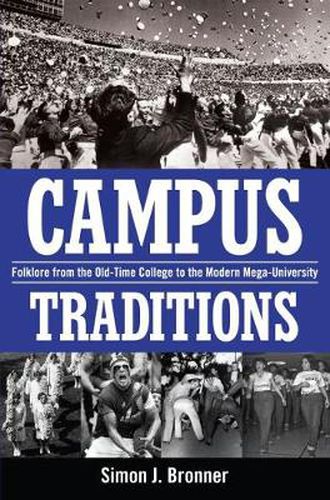Readings Newsletter
Become a Readings Member to make your shopping experience even easier.
Sign in or sign up for free!
You’re not far away from qualifying for FREE standard shipping within Australia
You’ve qualified for FREE standard shipping within Australia
The cart is loading…






From their beginnings, campuses emerged as hotbeds of traditions and folklore. American college students inhabit a culture with its own slang, stories, humor, beliefs, rituals, and pranks. Simon J. Bronner takes a long, engaging look at American campus life and how it is shaped by students and at the same time shapes the values of all who pass through it. The archetypes of absent-minded profs, fumbling jocks, and curve-setting dweebs are the stuff of legend and humor, along with the all-nighters, tailgating parties, and initiations that mark campus tradition–and student identities. Undergraduates in their hallowed halls embrace distinctive traditions because the experience of higher education precariously spans childhood and adulthood, parental and societal authority, home and corporation, play and work.
Bronner traces historical changes in these traditions. The predominant context has shifted from what he calls the
old-time college,
small in size and strong in its sense of community, to mass society’s
mega-university,
a behemoth that extends beyond any campus to multiple branches and offshoots throughout a state, region, and sometimes the globe. One might assume that the mega-university has dissolved collegiate traditions and displaced the old-time college, but Bronner finds the opposite. Student needs for social belonging in large universities and a fear of losing personal control have given rise to distinctive forms of lore and a striving for retaining the pastoral
campus feel
of the old-time college. The folkloric material students spout, and sprout, in response to these needs is varied but it is tied together by its invocation of tradition and social purpose. Beneath the veil of play, students work through tough issues of their age and environment. They use their lore to suggest ramifications, if not resolution, of these issues for themselves and for their institutions. In the process, campus traditions are keys to the development of American culture.
$9.00 standard shipping within Australia
FREE standard shipping within Australia for orders over $100.00
Express & International shipping calculated at checkout
From their beginnings, campuses emerged as hotbeds of traditions and folklore. American college students inhabit a culture with its own slang, stories, humor, beliefs, rituals, and pranks. Simon J. Bronner takes a long, engaging look at American campus life and how it is shaped by students and at the same time shapes the values of all who pass through it. The archetypes of absent-minded profs, fumbling jocks, and curve-setting dweebs are the stuff of legend and humor, along with the all-nighters, tailgating parties, and initiations that mark campus tradition–and student identities. Undergraduates in their hallowed halls embrace distinctive traditions because the experience of higher education precariously spans childhood and adulthood, parental and societal authority, home and corporation, play and work.
Bronner traces historical changes in these traditions. The predominant context has shifted from what he calls the
old-time college,
small in size and strong in its sense of community, to mass society’s
mega-university,
a behemoth that extends beyond any campus to multiple branches and offshoots throughout a state, region, and sometimes the globe. One might assume that the mega-university has dissolved collegiate traditions and displaced the old-time college, but Bronner finds the opposite. Student needs for social belonging in large universities and a fear of losing personal control have given rise to distinctive forms of lore and a striving for retaining the pastoral
campus feel
of the old-time college. The folkloric material students spout, and sprout, in response to these needs is varied but it is tied together by its invocation of tradition and social purpose. Beneath the veil of play, students work through tough issues of their age and environment. They use their lore to suggest ramifications, if not resolution, of these issues for themselves and for their institutions. In the process, campus traditions are keys to the development of American culture.